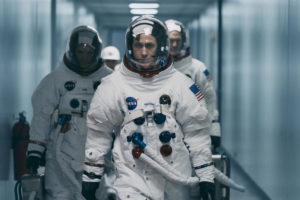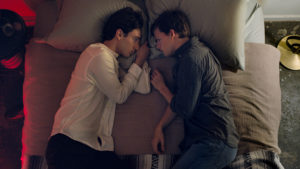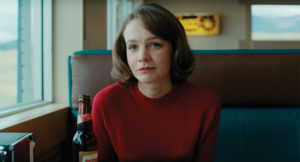
This is the second installment of a four-piece series of reviews of the Toronto International Film Festival (TIFF).
TIFF DAY 2
“First Man” (B+)
Damien Chazelle has become a cinematic wunderkind, writing and directing award-winning films like “Whiplash” and “La La Land.” And while both of those films met their own controversy and adoration, “First Man” may be his most controversial and stylistically daring effort yet. This docudrama about the experiences of Neil Armstrong (Ryan Gosling), his wife Janet (Claire Foy) and fellow NASA astronauts during the years leading up to Apollo 11 has yet to be widely released, but the film has already been met with uproar from conservatives for not featuring a scene in which the American flag is planted on the moon. Yeah, you read that right. After hearing the tea, my sister and I promptly decided to attend a screening.
Films that commemorate the complexity of American patriotism in the 1960s, (“Forrest Gump,” “Across the Universe”) often feature a quintessential street skirmish scene between anti-Vietnam protesters and the police. But these images are not revelatory because audience members typically share vague, if not vehement, remorse about the Vietnam War. This is why “First Man,” a tender, albeit unpretty, shaky-camera look at Armstrong’s life that critiques space race era America, works. The film dares to ask at what cost (individually and nationally) institutions set their sights on everlasting glory.
While “First Man” critiques what some consider an unblemished American triumph, it wags no fingers and raises no voices. The most tumultuous scene, aside from the ultimate rocket launch, is of a protest in which Gil Scott Heron (Leon Bridges) sings about the struggles of the black community but sarcastically claims that “at least whitey’s on the moon.” Chazelle’s subtly critical approach — alongside the film’s more specifically biographical elements — is impactful because it seems self-aware without condemning any patriotic or unpatriotic sentiment. But it’s the bereavement Armstrong faces after his daughter’s untimely passing and his subsequent time at NASA that anchors the film to its central sweet and somber tone. Gosling’s performance as a man torn between an opportunity to participate (at home, in the field, for his country) and an obligation to serve is stapled by his signature and compelling scorned-man smolder. But it is Foy’s tour-de-force execution of the self-assured woman, determined to tether her life and husband to Earth, that moved me most. Watching “First Man” first thing in the morning is what I imagine floating through space is like: beautiful all around, but daunting to reconcile once your feet touch the ground.
Boy Erased (A-)
The contemplative, troubled mood I left “First Man” with intensified after viewing Joel Edgerton’s “Boy Erased,” a film adaption of Garrard Conley’s eponymous memoir, which documents his time in a gay conversion camp. “Boy Erased” reiterates how common conversion therapy still is and implies how much change needs to occur to end it.
“Boy Erased” follows the life of Jared Eamons (Lucas Hedges), the charismatic son of Baptist Pastor Marshall Eamons (Russell Crowe) and Nancy Eamons (Nicole Kidman), who is outed at college and subsequently sent to a fundamentalist conversion camp. While religiosity and homophobia are unsurprisingly adjacent in the minds of those who antagonize Jared, “Boy Erased” takes a strong stance against typecasting his parents or even the staff at his conversion camp as villains. Rather, they are all complexly humanized as ignorant, prejudiced people who are the products of their environment. The film by no means gives them a moral pass. Rather, it challenges the audience to consider that their homophobia is not a blind hatred for Jared but rather a deeply misguided belief that efforts to “convert” him are an act of love. (“Boy Erased” contains depictions of sexual assault.)
As I took my seat, I thought of a friend who had expressed disappointment that the film’s lead, Lucas Hedges, was not a gay male actor, although he has been outspoken about his sexual fluidity. I thought about how my own straightness would inevitably influence my viewing of the film. I wondered if Edgerton, Hedges and (far less substantially) myself were in someway buttressing heteronormativity by using our individual platforms to amplify stories about queer people. I wondered if LGBTQ+ stories should only be made and reviewed by members of the community or if straight people were doing their part by highlighting these stories. I do not know the answers to these questions, nor do I believe it is my place to answer, as much as it is my responsibility to ask.
Edgerton’s direction, writing and performance in the film as Victor Sykes, the head therapist of the conversion camp, effectively capture the gendered nature of Southern culture and the results of its foundation in both religious conservatism and heteronormativity. Further, the love between Jared and his mother Nancy, a believer torn between the pathos of her husband’s congregation and her love for Jared, lifts the film out of the dark tone in which it is otherwise embedded. Given that the film is based on a true story, Hedges and Kidman do a laudable job at capturing the love between Conley and his real life mother, Martha, who, alongside Edgerton, participated in a live Q&A after the screening. Martha expressed, with remorse, her complicity in the violence against her son and echoed the film’s assertion — that it is the responsibility of the ignorant, not the gay, to change.
Wildlife (B-)
After being gutted by scenes of bittersweet moon landings and church sing-a-longs, Paul Dano’s film adaptation of Richard Ford’s novel “Wildlife” was a more temperate, albeit bonafide, downer about a 1960s Montana family in shambles. The Brinsons, a working-class family composed of Jerry (Jake Gyllenhaal), Jeanette (Carey Mulligan) and their teenage son Joe (Ed Oxenbould), move to Montana, hoping for a fresh start. However, that hope is dashed when Jerry struggles to find stable work and subsequently plunges into a downward spiral that leaves him emotionally volatile. “Wildlife” evaluates the dissolution of Jerry and Jeanette’s marriage after Jerry takes a job fighting Montana forest fires and Jeanette begins an affair. The audience, like Joe, staggers between scenes of his parents’ folly and heartache as he tries to reconcile what it means to be a helpful bystander and good man.
Jerry is another intriguing and gritty family man role for Gyllenhaal, who proved with previous roles in “Nocturnal Animals” and “Nightcrawler” that he can wallow and grit his teeth with the best of them. However, Gyllenhaal had far less screen time than I was anticipating, which made understanding Joe’s adoration of him, despite Gyllenhaal’s incendiary antics, more challenging than it should have been. Mulligan’s performance as a midcentury matriarch, longing for male companionship and personal autonomy, makes for some thoughtful social commentary about the relationship between gender, class and social power. Dano seemed to want his audience to sympathize with two imperfect parents, but I found myself impatient with an absent man and frustrated at the choices of a woman now unhinged. “Wildlife” made me question whether negligence from a partner can push someone into another’s arms, or if people just quietly choose to stop working on relationships. While Mulligan and Gyllenhaal shine in their own ways, Oxenbould’s haunting and dopey-faced performance carries the film. He carefully represents the pain that can accompany being the son of an unfulfilled woman and an easily emasculated man with “beautiful intention.”
The post The Wheel Takes TIFF: Day Two (9/12) appeared first on The Emory Wheel.



